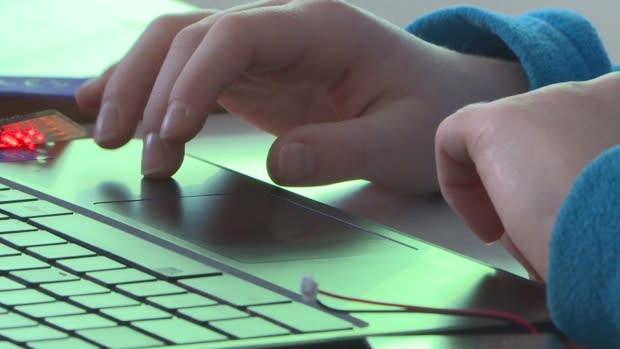To tackle internet troubles, N.L. school district pledges every trick in the book
It might take every trick in the book — including an old-fashioned phone call — but the Newfoundland and Labrador English School District is pledging a better experience for students if classes are forced online again in the upcoming school year.
Although in-class instruction is the district's stated preferred option, it has invested in professional development and training for teachers to prepare for a possible return to distance education.
It's also preparing thousands of devices that it can distribute to families across the province to address internet connectivity gaps.
"If we find ourselves there in the fall, it will be very different," said Terry Hall, an assistant director of education at the district.
"It will be more robust."
In March, students found themselves at home, and firing up their laptops, when COVID-19 shut down schools across the province.
Hall said "patience was the order of the day back then," as teachers and families tried to sort out the world of distance education and video calls. Now, the district has learned from those experiences, he said, and is "better prepared for September in the event that we end up there."

Connecting rural families
Part of the challenge will be adequately addressing connectivity issues in rural Newfoundland and Labrador. Some parents fear that a return to a second round of at-home, distance education will put their children at a long-term disadvantage.
In the spring, the school district distributed 200 MiFi devices — a device that turns cellular data into a WiFi hotspot — to families across the province.
That device is as good as the cellular infrastructure it relies on, and in areas of the province where cell service is unavailable, it won't work at all.
Hall said the district has other devices that it can use for families in that situation.
"If all else fails on those fronts, and it's just not available, we certainly will pre-load a device to make sure that all students have all the information that they need," Hall said.
"Any curriculum that a teacher would be planning on delivering to students, any notes, any of the lessons to be learned, we could actually take those lessons and actually put it onto the device itself. So when you're at home, you don't need to have internet in order to access it."

The provincial government has pledged $20 million to buy laptops for teachers and Chromebooks for students. It says it wants every high school and junior high school student to have a device.
Hall said the school district was able to get 4,000 devices out the door in the spring. Principals and teachers will work to identify which areas and which families will need devices already loaded with class material.
In part because attendance was not mandatory, and in part because their connection was so poor, some rural students and families said they didn't attend many video chat classes led by instructors in the spring.
Those sessions could be more important this fall, as both the school district and Newfoundland and Labrador's Department of Education say if the pandemic cancels any classes, there are other scenarios where distance education becomes part of the solution for students.
Dialing in
Hall said where video calls won't work, teachers will find other options.
"Maybe instead of a half-hour online, it could be even a five- or 10-minute phone call, to make sure that the teacher is still connected, the district is still connected with the student while they are doing their plans," he said.
"It could mean once a week that the student may come on the phone or be able to get by the school and connect directly, just to stay connected and making sure that they're keeping up on their studies."

He said teachers and principals might ask families to rely on WiFi hotspots inside school buildings, which tend to have good connections — even in rural communities where most households do not.
As of 2018, less than half of rural households in Newfoundland and Labrador have access to home internet speeds that reach the CRTC's 50 megabit per second download target.
"We wish we could have a consistent model, and that we had control of everything. Unfortunately, we don't," Hall said.
"We'd like to be able to say 'we want connectivity here, and make it happen, and be consistent.' We are trying to be as equitable as possible and as much as possible as we can."
A phone call might not be as interactive as an online class, but Hall said the district is doing the best it can with the tools it has.
"We don't want to say 'do one versus the other,' I think what we'll find is dependent upon the area, dependent upon even a location with an area, we'll have to adapt."
The earliest schools across the province can reopen to students is Sept. 9. Teachers will be back a week earlier, on Sept. 2.
Read more from CBC Newfoundland and Labrador


